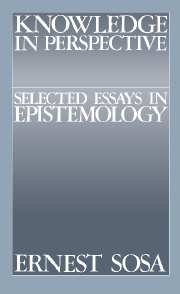Book contents
- Frontmatter
- Contents
- Sources and acknowledgments
- Introduction: back to basics
- PART I WHAT IS KNOWLEDGE, AND HOW IS IT POSSIBLE?
- 1 The analysis of “knowledge that p”
- 2 How do you know?
- 3 On our knowledge of matters of fact
- 4 Presuppositions of empirical knowledge
- PART II THEORIES OF JUSTIFICATION
- PART III INTELLECTUAL VIRTUE AND EPISTEMIC PERSPECTIVE: A VIEW PRESENTED
- PART IV INTELLECTUAL VIRTUE IN PERSPECTIVE: THE VIEW DEVELOPED
- Index
4 - Presuppositions of empirical knowledge
Published online by Cambridge University Press: 08 January 2010
- Frontmatter
- Contents
- Sources and acknowledgments
- Introduction: back to basics
- PART I WHAT IS KNOWLEDGE, AND HOW IS IT POSSIBLE?
- 1 The analysis of “knowledge that p”
- 2 How do you know?
- 3 On our knowledge of matters of fact
- 4 Presuppositions of empirical knowledge
- PART II THEORIES OF JUSTIFICATION
- PART III INTELLECTUAL VIRTUE AND EPISTEMIC PERSPECTIVE: A VIEW PRESENTED
- PART IV INTELLECTUAL VIRTUE IN PERSPECTIVE: THE VIEW DEVELOPED
- Index
Summary
In the following pages five cases of abnormality are examined. It is argued that each reveals presuppositions that apparently underlie much of our commonplace empirical knowledge. And it is also argued that together they support a certain account of such knowledge, one that yields the following ideas: (a) that you know only when you believe correctly what is evident to you; (b) that for something to be evident to you, you must believe it reasonably, your belief must be reasonable; and (c) that the framework of beliefs, assumptions, experiences, or what not, if any, that supports your reasonable belief must not be flawed by a falsehood, i.e., must not involve as an essential component any false presupposition, assumption, presumption, claim, judgment, belief, or the like.
RECOGNITION AND CLASSIFICATION
The strange case of the masked burglar
It may well be thought that the framework (explicit or implicit) that underlies the recognitional judgment that here again is N before me is approximately this: (a) on past occasions when it has looked N-like, it has been due to the fact that it was N himself before me with what, in the circumstances, was his natural look; (b) here again something looks N-like in circumstances like those in the past when N has presented to me his natural N-like look; (c) if so, then here again it looks N-like because once again it is N himself before me, with his natural look in the circumstances.
- Type
- Chapter
- Information
- Knowledge in PerspectiveSelected Essays in Epistemology, pp. 51 - 62Publisher: Cambridge University PressPrint publication year: 1991



